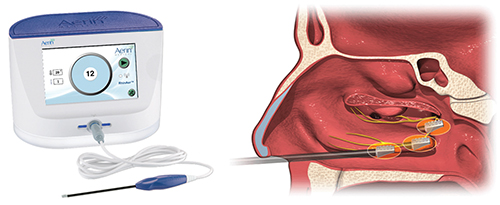FHN » Find a Service » Ear, Nose, and Throat (Otolaryngology) » Aerin RhinAer Radiofrequency Treatment
Relief remains wonderful in all its forms … so FHN Otolaryngologist Terry Donat, MD, FACS, FICS continues to expand the availability of minimally-invasive office procedures for those affected by bothersome nasal and sinus problems which interfere with their enjoyment of life.
If you are still seeking your relief from persistent nasal drainage, persistent real trouble breathing though your nose, or chronic sinusitis, you now have even safer, more effective and long-lasting treatments available to improve the quality of your life. Minimally-invasive procedures for these conditions designed to be performed in the office under local anesthesia are a practice focus for Dr. Donat, a board-certified Ear, Nose and Throat (ENT) surgeon, to reach and help his patients suffering from sinus and nasal problems.
These new procedures also provide patients relief from fears which may prevent them from pursuing sinus and nasal surgery, such as the longoutdated practice of nasal packing for days after surgery. We haven’t routinely used nasal packing for any of the nasal or sinus surgeries discussed below for more than 25 years.

The new set of Aerin procedures for treating nasal congestion, nasal obstruction and excessive nasal drainage are minutes-long FDA- approved surgical procedures designed to bring relief to patients suffering from months or years of troublesome nasal drainage (rhinorrhea) and inferior turbinate congestion, usually from nasal allergies, changes in weather, inhaled irritants, or overactive nasal nerves, all of which can cause chronic nasal inflammation (rhinitis).
Rhinitis symptoms which are usually the most bothersome to candidate patients are a far-too-frequent watery nose, congestion which alternates sides of the nose, congestion in the morning, post-nasal drip, constant clearing of the throat and difficulty sleeping due to a runny nose.
RhinAer is a new focused radiofrequency approach that allows your caring team to get to the root cause of your runny nose, regardless of the cause, in nearly all cases, without significant risks of bleeding, even in people taking blood thinners, and without the side effects of highdose medications or other more complex treatments.
While seasonal or daily oral medications, like nasal sprays containing antihistamines and steroids, may greatly improve symptoms, it often seems like symptoms still break through or patients understandably grow tired of having to use their medications over such long periods of time.
In fact, some physicians now feel that the extended need for nasal sprays for years on end only rather reveals that we are truly still failing to ease our patients’ suffering with prescribed medications; but that those shortfalls can be managed far better using Aerin RhinAer.
For this reason, RhinAer also does not necessarily require an extended period of time to prove medications have failed before considering it to reduce or eliminate your reliance upon medications. Typically, patients who fail drainage-reducing medication or are simply tired of taking everyday nasal medications for years-on-end are good candidates for these treatments.
During the Aerin RhinAer procedure, which takes less than an hour under local anesthesia, our team uses a small wand to stun the specific nerves in the back of the nose with radiofrequency heat energy to relieve congestion and to reduce the amount of excess nasal mucous production, beginning over the next several weeks afterward and lasting at least several years.
After radiofrequency therapy in the office, you may typically return to work on the same or next day. Aerin RhinAer is effective in more than 80 percent of patients with a first application and may be safely and effectively repeated, if needed.
The spots on the sides of your nose where you pinch your nose or you might, much more dramatically, place a clothespin, to fully block your breathing are called the nasal valve. The nasal valve is the narrowest part of your airway from out in the world to all the way down to the depths of your lungs.
For many people, the nasal valve area seems to be a big factor in moderately to severely blocked or collapsed nasal breathing. Nasal valve collapse and inferior turbinate enlargement also can result in increased snoring, habitual sniffing, the desire to try external nasal strips and mouth breathing which may further affect your quality of life, quality of sleep and even be bothersome to those close to you.
Since the nasal valve and enlarged turbinate produce such nasal narrowing, any alterations in the structure of the nose affecting this area can result in increased resistance or blocked airflow. The most common causes of nasal valve collapse are previous rhinoplasty, nasal trauma and congenital weakness and age-related weakness of the upper and lower nose cartilages. While nasal valve collapse during vigorous physical activity may be normal, its collapse during normal breathing when awake or asleep is certainly not.
Aerin VivAer is an FDA-approved minutes-long focused radiotherapy surgical procedure under local anesthesia that is designed to specifically strengthen the position of the upper and lower nasal cartilages by remodeling the internal tissue strength for the sidewall of your nose above your nostril. Supporting the cartilages serves to reduce nasal valve collapse, nasal airway obstruction and help you breathe better. Studies have shown it to be effective in the vast majority of patients.